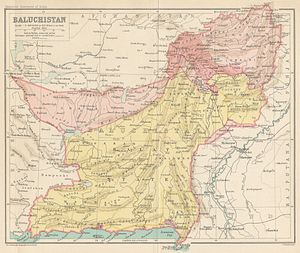Baloch alienation continues to increase in Pakistan as the upcoming national census, expected to take place in the next few months, might relegate them to minority status in Baluchistan. Many Baloch nationalist parties have accused the federal government of systematically converting the Baloch population into a minority in the province.
On many occasions, Baloch leaders have vowed to refuse the census results if their legitimate concerns are not addressed. Seemingly, the government remains indifferent, as it has announced that the population census will go on without addressing the status of other ethnic groups in Baluchistan, largely comprising immigrants, particularly Afghan refugees and Pashtuns.
The presence of a large number of Afghan refugees has had a weighty impact on the demographics of Baluchistan. In the aftermath of the Soviet invasion in 1979, Afghan refugees came to Pakistan in the millions. This created a substantial demographic imbalance between the majority Balochs and the Pashtuns. According to some reports, more than four million Afghan refugees have settled across Baluchistan and a large number of them have obtained citizenship and other rights.
Afghan refugee settlement across Baluchistan has further exacerbated Baloch and Pashtun tensions in the province. According to the United Nation High Commission for Refugees (UNCHR), around 80 percent of Afghan refugees in Pakistan are Pashtuns, and the majority of them live in Baluchistan. Many of them are expected to remain there, substantially augmenting the province’s already formidable Pashtun minority.
The issue of the Pashtun population in Baluchistan recently reared its head in the all parties’ conference, which was meant to smooth out differences between the government and local political parties over the China Pakistan Economic Corridor (CPEC). A Baloch leader was quoted as saying that “I fear more Pashtuns will come to Balochistan in search of jobs, squeezing the Baloch population further.” He further said that “the issue of Afghan refugees and unregistered Pashtuns must be settled before the census.”
With the development of the Gwadar port and CPEC, a large number of people from other areas of the country are likely to settle in Baluchistan, becoming voters in the province. According to some officially released data, the development of Gwadar port city is almost certain to result eventually in a huge influx – estimates run as high as 5 million – of non-Baloch into the Province’s southern districts. The migration and settlement of people into the province from outside is expected to further dwarf the Baloch population.
Over the years, the trust deficit between the Baloch nationalists and the federal government has augmented. Increasing differences over mega projects such as the Gwadar Port and CPEC have further compounded the problem. Moreover, one of the contributing factors to increasing Baloch alienation is their relative absence from various organs of government. Even most of the provincial jobs are held by outsiders.
Furthermore, the state has always remained wary of Baloch nationalism and has used a wide range of tactics to counter it. For instance, allegedly, the state has made alliances with the Pashtun Islamist parties to counterbalance the power base of Baloch nationalists. Many even claim that the state has funded thousands of religious schools across the province to promote religious radicalization over ethnicity-based nationalism.
Besides, to contain the Baloch insurgency, there have been many planned demarcations. For instance, during the 1960s, the Baloch population opposed the inclusion of three Pashtun-majority districts from the North-West Frontier Province (NWP) into Baluchistan and the separation of a few Baloch majority areas from Baluchistan into Punjab and Sindh. The demarcation of these new boundaries resulted in a reduced Baloch majority in Balouchistan. “Besides formation of new provinces, the areas of Baluchistan, including Dera Ghazi Khan and Rajanpur, should be incorporated into the province,” the Baloch National Party (BNP) recently said.
Arguably, the Baloch population may already be in the minority in Baluchistan. Due to the decade’s long war and unrest in the province, a large part of the Baloch population has settled in other provinces—particularly in Sindh. Pakistan’s Senate chairman recently said that “Baloch people’s apprehensions that they would be demographically converted into a minority as a result of the population census should be looked into through a possible legislation to limit the right of vote of immigrants to the place of origin.”
Pakistan’s federal government needs to address the Baloch people’s legitimate concerns. A failure to do so would only result in more alienation and unrest in the province, which can only undermine the ongoing reconciliation efforts.

































